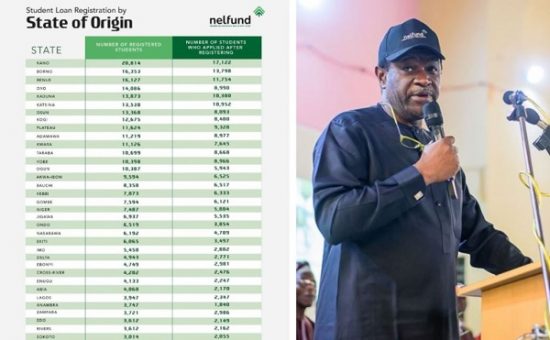The Nigerian Education Loan Fund (NELFUND) has revealed the data showing student loan applicants by state of origin.
President Bola Tinubu in July launched NELFUND.
The revised Student Loan Act 2024 was signed to remove financial barriers and make education more accessible to all Nigerian students, regardless of their economic background.
The loans cover tuition, fees, and maintenance costs. The repayment process starts two years after the beneficiary completes the NYSC program.
The Federal Government recently allocated over N2.5 billion in student loans to over 22,00 students nationwide, with institutions in the Southeast notably absent from the list of beneficiaries.
Students from Kano and Borno States have emerged as the frontrunners in the NELFUND student loan applications.
NATION
Kano State recorded 17,122 applications out of 20,814 registered tertiary students.
Borno State followed closely, with 13,798 students applying for the loan out of 16,353 registered students.
These figures were shared on NELFUND’s X account, highlighting the distribution of registered students and subsequent loan applicants by state of origin.
READ ALSO: JUST IN: NELFUND Postpones Student Loan Application for State-owned Institutions
Benue State ranked third, with 11,754 of its 16,127 registered students applying for the student loan.
Oyo State saw 14,086 students register, with 8,990 moving forward with the application process.
In Kaduna State, 13,873 students registered, and 10,380 proceeded to apply.
Katsina State had 13,538 students register, of which 10,952 eventually applied.
Osun State registered 13,368 students, with 8,093 applying for the loan.
Kogi State saw 12,675 students register for the NELFUND student loan, with 8,400 of them proceeding to apply.
In Plateau State, 11,624 students registered, and 9,328 of them went on to submit their loan applications.
Adamawa State had 11,219 students register, of which 8,977 successfully applied for the loan.
Kwara State recorded 11,126 registrations, with 7,645 students applying for the loan.
READ ALSO: UPDATED: Tinubu Signs Student Loan Bill Into Law
In Taraba State, 10,699 students registered for the student loan, and 8,668 of them proceeded to apply.
Yobe State had 10,398 students register, with 8,966 going on to apply for the loan.
Ogun State saw 10,387 registrations, with 5,943 students moving forward with the application.
Akwa Ibom State recorded 9,594 registrations, with 6,525 students applying for the loan.
Nigeria, Benin Republic open dry port trade office in Kano
In Bauchi State, 8,358 students registered, and 6,517 applied for the student loan.
Kebbi State had 7,873 students register, with 6,333 proceeding to apply for the loan.
Gombe State recorded 7,594 registrations, with 6,121 students applying for the loan.
Niger State saw 7,487 students register, and 5,804 of them went on to submit their loan applications.
In Jigawa State, 6,937 students registered, with 5,535 successfully applying for the loan.
READ ALSO: JUST IN: National Assembly Passes Student Loan Bill
Ondo State had 6,519 students register, with 3,854 proceeding to apply for the student loan.
Nasarawa State saw 6,192 students register, and 4,789 of them applied for the loan.
Ekiti State recorded 6,065 registrations, with 3,497 students applying for the loan.
In Imo State, 5,458 students registered, with 2,802 going on to submit their loan applications.
Delta State saw 4,943 registrations, with 2,771 students applying for the loan.
Ebonyi State recorded 4,749 registrations, with 2,981 students applying for the loan.
In Cross River State, 4,282 students registered and 2,476 of them proceeded to apply.
Enugu State had 4,133 students register, with 2,247 successfully applying for the loan.
READ ALSO: FG Lists Conditions For Student Loan Applicants
Abia State saw 4,068 registrations, with 2,170 students moving forward with the application.
Lagos State recorded 3,947 registrations, with 2,347 students applying for the loan.
Anambra State had 3,747 students register, with 1,840 proceeding to apply for the student loan.
In Zamfara State, 3,721 students registered, and 2,986 of them successfully applied for the loan.
Edo State saw 3,612 registrations, with 2,149 students applying for the loan.
Rivers State recorded 3,612 registrations, with 2,162 students applying for the loan.
Sokoto State had 3,014 students register, with 2,055 proceeding to apply for the student loan.
Bayelsa State saw 1,977 students register, with 1,267 of them applying for the loan.
In the Federal Capital Territory Abuja, 894 students registered for the loan, while 676 proceeded to submit their applications.
NATION
